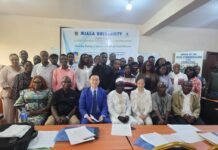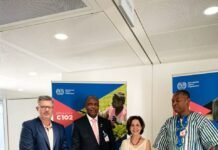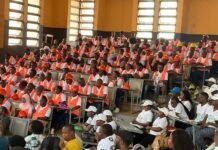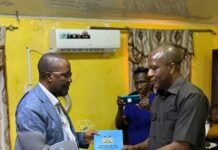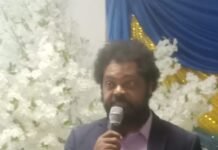With support from the Africa Transitional Justice Legacy Fund (AJLF), the West Africa Network for Peacebuilding (WANEP) on Wednesday 17th February 2021 organized a day’s Community Town Hall Meeting for 50 traditional leaders, women and war victims from Grafton at the Negus Nagas Entertainment Center, Grafton outside Freetown.
At the well-attended meeting, women were admonished that if they rise up to the occasion, they would change the narrative.
Giving a background to the project, the National Coordinator of WANEP, Dr. Isata Mahoi articulated that the overall objective of the project is to enhance the capacity of victims of the civil war to engage the state in the implementation of a transparent and inclusive reparation program in the country and to ensure that the processes and procedures of traditional dispute resolution are complaint with basic human rights standards stressing that most of the laws in Sierra Leone are drafted by men and that traditional leaders represent the people and therefore the need for them to know and understand their roles and responsibilities need not be overstated.
Dr. Mahoi also highlighted the different types of conflicts-intra, inter and international.
She furthered that the project seeks to particularly contribute to establishing and expanding spaces for women, especially market women, to access gender-responsive needs in addition to ensuring that the processes and procedure of traditional dispute mechanism are complaint with basic human right standards using traditional dispute resolution systems through increased understanding and raising awareness by building the capacity of traditional leaders who are often caught up between being the perpetrator and the ones executing the laws as well as build on the capacity of war-affected and wounded victims to interact with the state and enable them participate in reparations programs.
The Chairman, Western Area Rural District Council, Mr. Kasho J. Holland-Cole underscored the importance of the workshop to the people, recalled that he experienced the civil war, Ebola and Corona virus pandemic other events, that Sierra Leone is not observing the outbreak of the war for which past and present governments are responsible and that people are not holding duty bearers accountable.
According to Mr. Cole, there is little reference to the Truth and Reconciliation Commission (TRC) report by stakeholders, that there are challenges with the reparations program, that some people are still threatening war, that the civil war was senseless and affirmed that the country has very good laws but that implementation is the problem.
He also appealed to all not to politicize the Corona pandemic that is real reiterating that women have a vital role to play in national development concluding that most of the laws are to protect women and urged traditional leaders not to impose unreasonably fines on people but mediate and amicably resolve disputes.
Alhaji Mohamed Suma, an expert in transitional justice for 20 years working in Sierra Leone, Ivory Coast and Mali and also worked for CARL and the Special Court for Sierra Leone talked on transitional justice and lasting peace for countries not to return to war pointing out that transitional justice is to prevent a return to war citing as examples establishment of the Truth and Reconciliation Commission (TRC)-2002-2004, statements from victims and perpetrators all as part of the truth seeking process and disclosed that former President Ahmad Tejan Kabba, the head of the police and military and other state institutions also testified at the TRC.
Ahaji Suma went on to state that in 2009, former President Ernest Koroma, on behalf of government, apologized to women for the atrocities they suffered during the civil war, that some people confessed at the TRC, especially those who bear the greatest responsibility for the war but lamented that most of the causes of the civil war are still prevalent including corruption, injustice and nepotism and reminded all that the Special Court also tried the key commanders and financiers of the war and other key actors.
Renowned civil society activist, Ms. Valnora Edwin observed that after the civil war, institutional reforms were implemented to prevent a return to war, warned that politicians are more interested in maintaining power than working for the people, that government did not take the reparations program seriously citing non-budgetary allocation, free medical, education and transportation and provision of skills training to victims and entreated participants to always practice political tolerance as well as sensitize pupils about COVID, teenage pregnancy and other social issues in their communities.
She also appealed to the people to engage government to provide basic services like electricity, water supply, good roads and quality education, that one of the causes of the war was because women were left behind in national development and the decision-making process, that girls were not attending school, that girls were subjected to harmful traditional practices and called on women to be in the decision-making process since they are in the majority underlining that democracy provides the space for participation concluding, “if women rise up they will change the dynamics.”
The issue of war victims getting justice and reparations were extensively discussed by the 50 participants.








